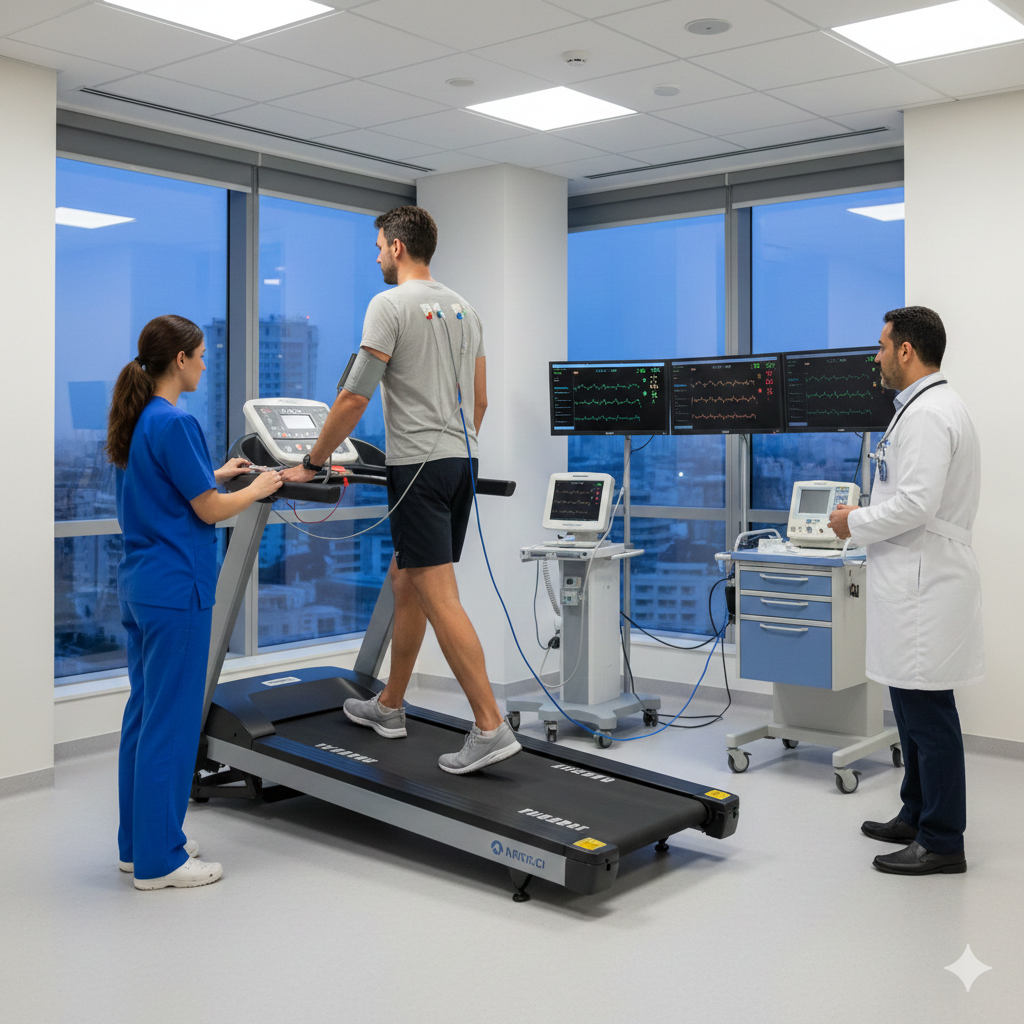- 19, Opp. Ramkrishna Math, Rahate Colony Road, Dhantoli, Nagpur -12, +91 9413564868
TMT Test
The TMT Test, also known as the Treadmill Test or Exercise Stress Test, is a diagnostic tool used to evaluate the heart’s response to physical exertion. It is commonly performed to detect coronary artery disease (CAD), assess cardiac function, and monitor heart health in patients with symptoms like chest pain or shortness of breath. This test is non-invasive and provides valuable insights into how well the heart handles increased workload during exercise.
TMT Test Duration
Total Duration: The TMT test typically lasts 15 to 30 minutes, including preparation, exercise, and recovery phases.
Breakdown:
- Preparation (5-10 minutes): ECG setup and baseline readings.
- Exercise (5-15 minutes): Treadmill speed and incline increase every 3 minutes until the target heart rate is reached or symptoms appear.
- Recovery (5-10 minutes): Monitoring heart rate and blood pressure until they return to normal.

Why TMT Test is Done?
The Treadmill Test (TMT) is performed for the following reasons:
- Detect Coronary Artery Disease (CAD): Identifies blockages or reduced blood flow in the heart arteries.
- Assess Heart Function During Exercise: Evaluates how well the heart handles physical stress.
- Monitor After Heart Attack or Surgery: Tracks recovery after bypass surgery, stent placement, or a heart attack.
- Detect Heart Rhythm Abnormalities: Identifies arrhythmias that may occur during exertion.
- Evaluate Exercise Tolerance: Helps determine fitness levels, especially for athletes or patients with heart conditions.
- Pre-Surgical Cardiac Assessment: Ensures heart stability before major surgeries, particularly for high-risk patients.
How the TMT Test is Performed
The TMT test is conducted in a clinical setting under the supervision of a trained cardiologist or technician. The procedure involves the following steps:
Preparation:
- The patient is advised to wear comfortable clothing and avoid heavy meals before the test.
- Electrodes are attached to the chest, arms, and legs to monitor the heart’s electrical activity.
- A baseline electrocardiogram (ECG) and blood pressure reading are recorded before starting the test.
Exercise on the Treadmill:
- The patient begins walking on a treadmill at a slow speed.
- Every few minutes, the speed and incline of the treadmill are increased to create a progressively challenging workload for the heart.
- The patient’s heart rate, blood pressure, and ECG are continuously monitored.
Monitoring Symptoms:
- The patient is instructed to report any discomfort, such as chest pain, dizziness, or breathlessness.
- The test is stopped if the patient experiences severe symptoms, abnormal ECG readings, or dangerously high blood pressure.
Post-Test Recovery:
- After the treadmill session, the patient is monitored for a few minutes as heart rate and blood pressure return to normal.
- The doctor analyzes the ECG results and blood pressure responses to interpret the findings.
Interpreting TMT Test Results
The results of the TMT test help in diagnosing and assessing heart conditions:
Normal TMT Test:
- No significant changes in ECG, heart rate, or blood pressure.
- The patient can complete the required exercise stages without symptoms.
- Indicates a healthy heart with no major blockages in the coronary arteries.
Abnormal TMT Test:
- ECG changes, such as ST-segment depression or elevation, suggest inadequate blood flow to the heart.
- Symptoms like chest pain, dizziness, or excessive fatigue indicate potential heart disease.
- The doctor may recommend further tests, such as an angiogram, to confirm coronary artery disease.
Preparation Tips for a TMT Test
Avoid Heavy Meals & Caffeine
Refrain from eating large meals, drinking coffee, or smoking at least 2-3 hours before the test to prevent discomfort and ensure accurate results.
Wear Comfortable Clothing & Shoes
Opt for loose-fitting clothes and sports shoes to ensure ease of movement during the treadmill test.
Medication Guidance
Inform your doctor about any medications you take, as some may need to be adjusted or stopped temporarily before the test.
Stay Hydrated
Drink water as needed, but avoid excessive fluid intake right before the test to prevent discomfort.
Get Proper Rest
Ensure a good night’s sleep before the test to avoid fatigue, which may affect your performance and test results.
Communicate Any Discomfort
Inform the technician immediately if you experience chest pain, dizziness, or breathlessness during the test to prevent complications.

